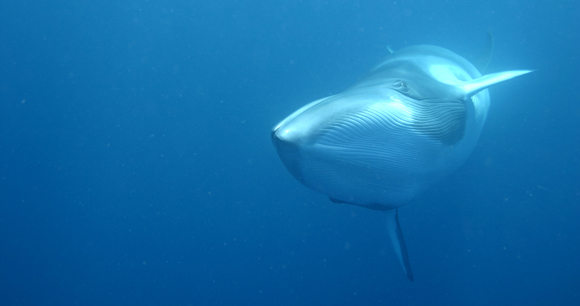
Ricky Gervais, Stephen Fry, and Jane Goodall, Among Stars Urging G20 to Act for Whales
Osaka, Japan—Celebrities and animal conservation and welfare NGOs from across the globe are calling for an “international whaling intervention” to be staged at the G20 summit in Osaka as summit host Japan prepares to launch a renewed commercial whaling program1. The program will see Japan openly killing sei, Bryde’s and minke whales for consumption with no pretense of science2.
Letters have been sent to all G20 leaders calling on them to publicly object at the summit to Japan’s commercial whaling intentions, and to deliver a joint declaration calling for the end to all commercial whaling globally. Celebrities including Stephen Fry, Ricky Gervais, Dr. Jane Goodall, and Nicky Campbell, alongside more than 100 conservation organizations and champions3 from G20 countries4, are backing pleas for international anti-whaling pressure to be placed on Japan.
“For decades, Japan threw a thin veil over its commercial whaling operations by referring to it as ‘scientific whaling.’ It has now elected to lift the veil and abandon all pretense of international cooperation on whale conservation,” said Cathy Liss, president of the Animal Welfare Institute (AWI). “The other G20 nations should not stand idly by while Japan pursues this outdated, unsustainable, and undeniably cruel practice.”
There is no commercial or other pressing need for Japan to relaunch its whaling activity, with whale meat consumption in Japan down almost 99% from 1962 to 2017, when fewer than 4,000 tonnes were eaten5. But there is a huge need to prevent a further decline in whale numbers. The IWC international ban on commercial whaling, agreed to in 1982, has helped populations of great whales increase, saving several from extinction. Yet many whale populations remain low or endangered—and all whales face the huge threats of fishing-related deaths, ship collisions, climate change, and chemical, litter and noise pollution6.
With whales playing a key role in our marine ecosystems (including locking up carbon and providing nourishment for phytoplankton essential to ocean food chains) it is vital that governments around the world help to protect them to keep our seas healthy7. G20 leaders have the ideal opportunity at the Osaka summit to echo public opinion on the need for Japan to end this cruel and unnecessary practice. Peaceful anti-whaling protest events will also be taking place in London, Edinburgh and other cities around the world on Saturday to draw attention to this issue.
“Given the ever-shrinking demand, it is increasingly indefensible that the Japanese government feels the need to prop up its commercial whaling industry,” said Susan Millward, director of AWI’s marine program. “The vast majority of the international community—including many in Japan—see the importance of ending commercial whaling worldwide. It is our hope that the Japanese government will finally begin to see this, too.”
Read more about AWI’s efforts to end whaling: https://awionline.org/content/whaling.
Notes to editors:
- Japan is leaving the International Whaling Commission (IWC), effective June 30, 2019, and will be conducting commercial whaling in its exclusive economic zone and coastal waters. It will take three species in its new hunts—sei, Bryde’s and minke whales.
- Japan claims that its previous whaling programs were scientific research and allowed under the treaty that established the IWC, the International Convention for the Regulation of Whaling (ICRW). In a landmark case at the International Court of Justice in 2014, Japan’s scientific whaling was put on trial and the court found that it was not in conformity with the ICRW—that is, that it was not truly scientific in nature. Japan’s new whaling program in the North Pacific can be seen, therefore, as a continuation of its previous commercial activities, not the start of commercial hunts.
- Organizations supporting these calls in the US include: the American Cetacean Society, Defenders of Wildlife, and SeaLagacy. For a full list of the more than 100 organizations supporting the letter to G20 leaders, see the letter here: http://bit.ly/G20-Whaling.
- The members of the G20 are: Argentina, Australia, Brazil, Canada, China, the European Union, France, Germany, India, Indonesia, Italy, Japan, Mexico, Russia, Saudi Arabia, South Africa, South Korea, Turkey, the United Kingdom, and the United States.
- See p. 7-9 of IFAW’s 2017 Economics of Japanese Whaling Report.
- Since the moratorium has been in place, several whale populations have experienced significant signs of recovery. These include some humpback whale and southern right whale populations. Whale species that have populations still severely at risk include the North Atlantic right whale and the North Pacific right whale. See the IWC Intersessional report 2016-2018 for more.
- More information about the positive and important roles that whales play in marine ecosystems can be found here.
Sydney Hearst, (202) 446-2128, [email protected]